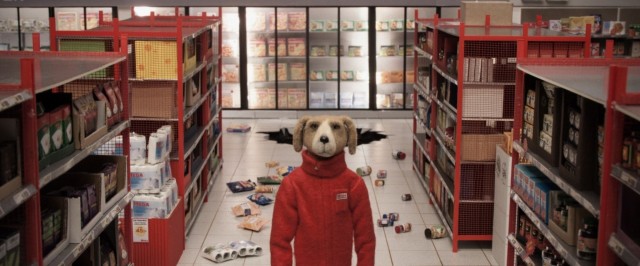“I will climb the ladder of happiness—when the burden is lifted from my shoulders.” Wouldn’t it be nice if that was the case? We have been waiting for years for Niki Lindroth van Bahr’s The Burden to finally be widely released online, and in my opinion, this is the kind of film that was worth the wait. Leading us into a world that is populated by singing single fish in bathrobes, dancing mice who work low-wage jobs, and overly friendly yet determined monkeys in an office space, we watch as they all try to escape their boredom and existential anxiety by performing cheerful musical turns. The description might sound unusual, but you have to watch the film for yourself to experience the magical oddity in all its glory.
The Burden is a beautifully melancholic short-film masterpiece that radiates a sense of pervading sadness, but counterbalances that dreariness with stingingly dark humor. Narratively, the short is structured as an absurdist musical set around a desolate cul-de-sac on an island floating in space, representing the outskirts of industrialized rural areas. Through its conception, the film exposes the surreal tropes of the musical genre: in real life, most people wouldn’t just start singing or dancing in a choreographed fashion during their tedious chores.
In effect, The Burden not only draws the viewer into the rhythm of its concept and eventually leaves you with a song stuck in your head, but it also manages to get to the core of the absurdity of life itself. In particular, it uncovers life in a disillusioned, emotionally detached society, full of loneliness and unfulfilled dreams, with the excrescence of mind-numbing capitalism epitomized by the aisles of a brightly lit supermarket and the cubicles of a call center.

A dog stacking shelves in a supermarket sings about his bad dream
The main emotion at the center of The Burden is an inherent loneliness that permeates every fiber of modern living conditions. Arguably, there is a difference between aloneness and loneliness, as well as between being and feeling alone. You can be surrounded by coworkers your entire day, but if your activities at work and the surroundings of the office only add to the feeling of hollowness inside oneself, it slowly but surely eats at your soul nonetheless.
We all have our own dreams and aspirations, even the call center clerks who get on your nerves with their gratuitous sales tactics. These unsolicited calls are just part of their job, and they’d much rather be somewhere else as well. Maybe the only thing that helps to break out of their day-to-day mundaneness is to break into song. If only the burden was lifted off their shoulders.
For the characters in The Burden, their specific loneliness is portrayed with accompanying reasoning and each will hold a mirror up to any viewer who can connect to these emotions. In the first scene, we even find ourselves in a designated hotel for people (or rather, anthropomorphized fish) who chose to live on their own, secluding themselves for seemingly obscure reasons which they decided wouldn’t let them fit in with humanity at large. They choose the lonely comfort of seclusion, just so that they don’t have to put up with the needs of potential partners and friends.
“I just read between the lines and then made up my mind”
As one of the fish sings, “It wasn’t anything someone said, I just read between the lines and then made up my mind”. I don’t know about you, but that sounds achingly familiar. This small piece of observational sing-song reminded me of how my own egocentric pessimism can drive a wedge between myself and other people, preventing my chances of true connection with others and my own happiness, while the perceived opinions are only a figment of my own imagination. It’s amazing the kind of deep reflection a singing fish can provoke.
For all its uncomfortable comedy and nihilistic tendencies, The Burden wouldn’t have the same effect if it wasn’t for the film’s meticulous stop-motion animation and the attentive character design. From the very first second we see the singing sardines, we know that this isn’t your typical musical. There is a quality to stop-motion animation that evokes an unreality that feels somehow familiar and strange at the same time. That way, two busboys step-dancing in an empty fast-food restaurant is curious enough, but when these busboys are actually skin-colored mice wearing little vests, it only heightens the extraordinariness of the situation.
Furthermore, the music itself plays an important part in creating the film’s peculiar atmosphere. I am certainly no expert in musical composition, but to me, the electronic melody feels simple yet fiendishly elaborate. In-between the songs, there is a somber note that triggers discomfort through its sound design alone. What amplifies the specific auditory elements of the film is the sentiment, that for anyone who doesn’t understand Swedish, the language and the high-pitched, synthesized voices add to the otherworldly depiction.
The Burden has been selected at festivals such as Clermont-Ferrand, Annecy and Cannes Director’s Fortnight, among many others, while I first saw it at Sundance London 2018. It has quickly become one of my all-time favorite shorts and was even one of the few shorts I bought on Vimeo on Demand because I couldn’t wait for its free online release. But now here it is, for everyone to enjoy. I admit that its existential themes and its slightly desperate tone can leave one with a sense of melancholy, but I would argue it is an enriching viewing experience in every way.

 Georg Csarmann
Georg Csarmann